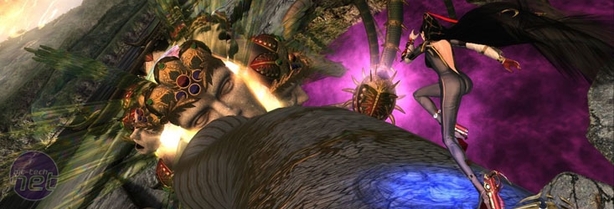
Devil Mayonetta
Saying Bayonetta is influenced by the likes of Devil May Cry is underplaying the point a bit. You don’t just see shadows of inspiration here; Bayonetta is the kind of game that represents the entire sum of its influences.In fact, the game probably shares more in common with the Tarantino tendency of plundering its influences for relics than anything else. It’s truly intertextual, borrowing elements from other games and working them into the structure of its design.
From the dropped halos that are scattered around the ground like rings straight out of Sonic the Hedgehog to challenge rooms that belt out tunes from Outrun and Space Harrier, Bayonetta isn’t just passively inspired by its own history; it actively churns out these references as you play.
It’s not shy about giving a nod or two to its predecessors either, and being directed by Devil May Cry’s own Hideki Kamiya, the most blatant tip-of-the-hat comes in the obvious shape of its heavily stylised chains of attacks. But it goes even further than that, becoming a sort of refined mosaic of the games that came before it.
Here you have a game properly sharing an entire genetic pool with its influences, but, to be fair, it’s impossible not to see a giant Kamiya-shaped imprint straight through the core of the game. With his hand in some of the most stylish games of the last decade, directing the likes of Viewtiful Joe and Okami, there are parts of his back-catalogue littered throughout Bayonetta’s entirety. Bayonetta can even shift forms into a panther styled after Okami’s Amaterasu, gearing up attacks to a rating system reminiscent of Viewtiful Joel.
It’s fair enough to say if you didn’t like Devil May Cry then you won’t like Bayonetta, but just leaving it there doesn’t really do it justice. What we have here is a game that’s gleefully aware it’s standing on the shoulders of videogame giants and even detractors should appreciate how the game acts as a formal system with built-in homages to previous games.
But this self-awareness can have its faults. As much as it is a game that’s aware of its history, it’s also the sort of game that basks in its own sense of irony, to its own detriment. From Bayonetta gaining health by sucking on lollipops, to the chirpy j-pop rendition of Fly Me to the Moon, right to her use of the phrase “bust a cap in yo ass”, there’s more than enough cheese here to satisfy the whole of France.
Bayonetta overcomes these few, fleeting moments though by legitimately bringing together the best aspects of the rest of its genre and turning a simple homage into something much more advanced and complete than it really has any right to be.

MSI MPG Velox 100R Chassis Review
October 14 2021 | 15:04











Want to comment? Please log in.